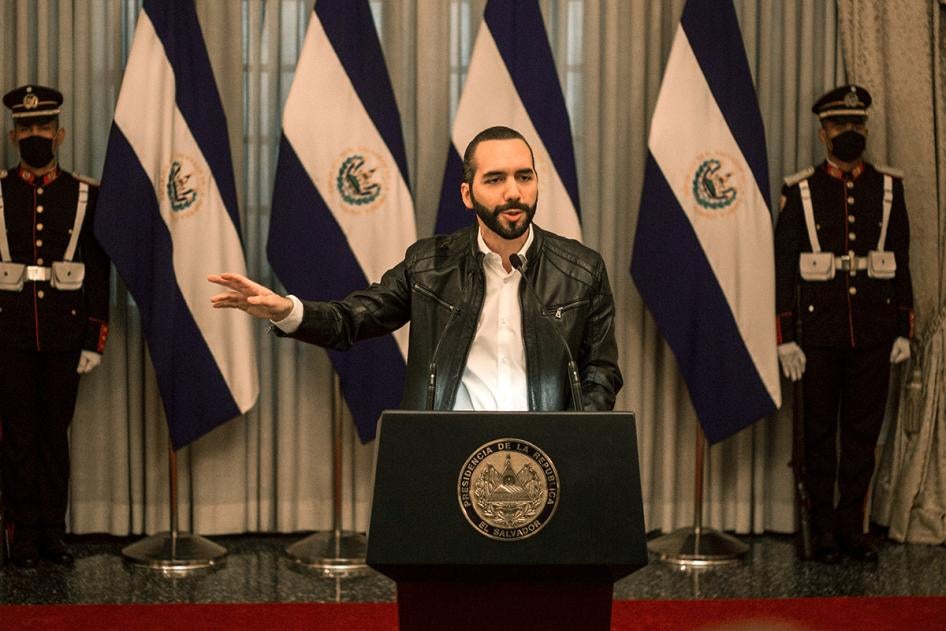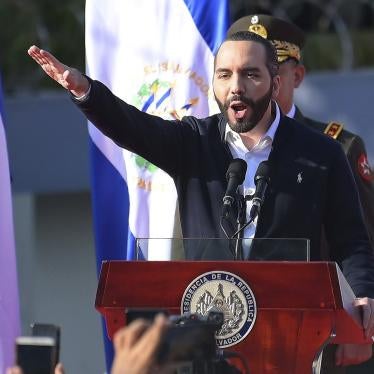President Nayib Bukele of El Salvador is seeking to concentrate all political power in his own hands. Washington should act swiftly to condemn his power grab.
May 1 was the first day his party held a two-thirds majority in the National Assembly, after winning elections in February — and he lost no time in misusing it. Bukele’s allies in the National Assembly summarily removed and replaced all the judges on the constitutional chamber of El Salvador’s Supreme Court, as well as the attorney general.
Over the past year, Bukele has publicly defied rulings by the constitutional chamber, lashing out at its judges. Removing them was a frontal attack on judicial independence, as international standards make clear that no judge should be removed simply because the government does not like its rulings.
Minutes after the legislators voted to unseat the judges, the constitutional chamber ruled that their decision violated judicial independence and ran counter to El Salvador’s constitution.
That night, Bukele’s lawmakers rushed through appointments of new magistrates and a new attorney general. A convoy of police officers, including national police director Mauricio Arriaza, escorted the new officials to their jobs. Arriaza, who is under investigation for obstructing a corruption probe against high-level government officials, was greeted with applause when he showed up at the National Assembly chamber later that night.
The Biden administration has, since taking office in January, expressed its “differences” and “concerns” with Bukele. When the Salvadoran president traveled to Washington in February, Biden administration officials rejected his requests for meetings.
So it probably came as no surprise to Bukele that his blow to the rule of law triggered strong condemnation from Washington, including by Secretary of State Antony Blinken and Vice President Harris. Bukele did not seem to care. “We want to work with you,” he tweeted in a message to his “friends in the international community” on the night of May 1. “But with all due respect: we are cleaning our house … and that is none of your business.”
Now, Bukele’s lawmakers are threatening to remove the human rights ombudsman, too. And the new attorney general has said he would “revise” his cooperation agreements with the International Commission Against Impunity in El Salvador, a body backed by the Organization of American States (OAS) to fight corruption in the country.
If Bukele continues, Salvadorans will have nowhere to turn when their rights are abused, and the fight against corruption will be in jeopardy.
The power grab has been swift and bold — and a similar response is needed to stop it.
Bukele thinks he has a winning card to play against the United States — immigration. Tens of thousands of Salvadorans flee to the United States every year, and Bukele may think the Biden administration needs to have him as an ally to address the root cases that force Salvadorans to flee.
President Biden should call Bukele’s bluff. Bukele needs an international flow of funds to maintain the narrative of efficiency that — together with his eccentric style — has given him high popularity ratings. If the United States leads a regional condemnation and makes clear that the attacks on judicial independence have consequences, Bukele is likely to take it seriously and cave to requests to protect rights and restore democratic institutions.
The United States should work with democratic governments in the OAS to seek a public statement of collective condemnation. The OAS Inter-American Democratic Charter allows any member state — or the group’s secretary general — to convene the region’s ambassadors when a member nation suffers an “unconstitutional alteration of the constitutional regime that seriously impairs the democratic order.”
The United States should also harness the considerable foreign aid it invests in the country, as well as its outsize voting power at key international financial institutions, to protect judicial independence and the rule of law. El Salvador has reportedly requested a $1.3 billion multiyear loan program from the International Monetary Fund. The United States should use its leverage to insist that, before approval, the Salvadoran government restore the independence of state institutions that are vital to transparent governance and effective accountability for corruption, in line with the IMF’s commitment to address serious governance gaps in all its loans.
And the United States should urge the World Bank and the Inter-American Development Bank to review their planned and ongoing projects in El Salvador and assess whether recent developments risk harming their objectives or contravene relevant policies.
If the United States fails to take bold action, it could have catastrophic effects — in El Salvador and beyond. Lack of judicial independence and the related inability to ensure rights and fight corruption are major factors driving Mexicans and Central Americans to the United States. Judicial independence is seriously threatened in Mexico, Guatemala and Honduras, and it is nonexistent in Nicaragua. U.S. and OAS failures to act decisively may be perceived, in these countries, as a green light for the authorities to continue their attacks on the courts and prosecutors.
For more than a year, we have been warning that President Bukele poses a serious threat to democracy and the rule of law in El Salvador. His actions have made that threat crystal clear.
Equally clear is the need to act boldly — and now.











